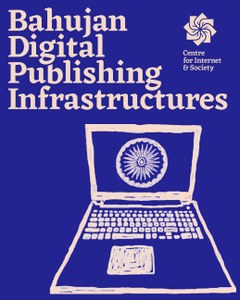Bahujan Digital Publishing Infrastructures
-
RAW
-
Digital Cultures

Yatharth
19 January 2025
Formal knowledge production, media, and technology in India are dominated and hegemonised by elite oppressor castes (the Savarnas). The exclusion of the caste-oppressed majority (the Bahujans) from mass media systematically erases their narratives, histories, and opportunities present to them.
We study how, despite systemic challenges, Bahujan publication spaces have emerged across digital media as sites of intersectional discourse on caste, using new media such as blogs, visual art, memes, YouTube channels, infographics, podcasts, etc. Further, we look at how this has exposed casteism buried under the ‘casteless’ facade of digital technologies, which are rife with issues of caste-based hate speech, poor moderation, algorithmic bias, and inadequate platform governance. For this, we draw on qualitative interviews with ten Bahujan publishing projects across social media.
Through a caste-critical lens, we look at motivations, infrastructural needs, editorial processes, audience engagement, other challenges, and the future vision for these publishing projects. We discuss questions of identity, community, hate speech, platform censorship, mental health, and self-care that emerge in online anti-caste publishing. Finally, we try to articulate an emerging vision of an anti-caste internet.
We explore the following questions through our research:
- Why do Bahujans start publishing?
What are the infrastructures of Bahujan publishing?
Who engages with anti-caste content?
What resistance do Bahujan publishers face?
How do Bahujan publishers view mainstream progressive movements?
How do Bahujan publishers think about the future of the internet?
The key takeaways from our research are:
- Publishing is a socio-technical response Digital Bahujan publishers have largely started in response to shifting political landscapes within India, where caste oppression, while increasingly invisibilised, has only strengthened. Bahujan publishing uses digital tools to challenge caste oppression, fostering anti-caste discourse and community building despite limited resources and systemic barriers.
- Publishing is a community effort Bahujan publishing exists primarily within online anti-caste communities. Anti-caste communities help each other navigate resource constraints to raise funds, build safe spaces to provide critical mental health support, provide safety from hate speech, and build resistance and resilience together.
- Caste mediates publishing infrastructure Caste hierarchies restrict resources and opportunities for Bahujan publishers, who often precariously self-fund their work. Meanwhile, media circles and the funding ecosystem are dominated by savarnas, who gatekeep their resources and knowledge from Bahujan publishers.
- Online Casteism is enabled by Platforms Social media platforms have failed to address rampant caste-based hate speech effectively, leaving Bahujan publishers to manage the hate speech on their own. This takes a severe toll on the publisher’s mental and emotional health, especially hurting Bahujan publishers from smaller towns, women, and queer folks.
- The future of Anticaste publishing is uncertain The reach of Bahujan publishers varies wildly and unexplainably, which makes it difficult for them to rely on social media for audiences and monetisation. Bahujan publishers face a triple whammy: algorithms that suppress anti-caste content, social media platforms moving away from political content, and contentious legislation that censors independent political content.
- The future of Anticaste publishing is on independent platforms Bahujan publishers desire platform sovereignty—to own and control their own platforms and to be able to control what they put out and how it reaches their audiences—and a vision of the internet that works towards the annihilation of castes, both online and offline.
Read the full report here